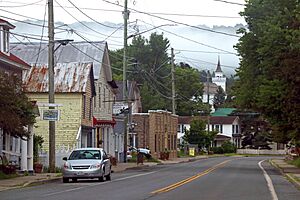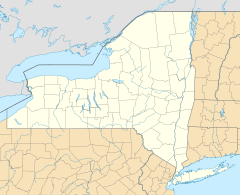Hobart, New York facts for kids
Quick facts for kids
Hobart, New York
|
|
|---|---|
|
Village
|
|
 |
|
| Motto(s):
"Jewel of the West Branch," "Book Village of the Catskills"
|
|
| Country | United States |
| State | New York |
| County | Delaware |
| Town | Stamford |
| Area | |
| • Total | 0.51 sq mi (1.31 km2) |
| • Land | 0.50 sq mi (1.29 km2) |
| • Water | 0.01 sq mi (0.02 km2) |
| Elevation | 1,650 ft (503 m) |
| Population
(2020)
|
|
| • Total | 351 |
| • Density | 704.82/sq mi (272.21/km2) |
| Time zone | UTC-5 (Eastern (EST)) |
| • Summer (DST) | UTC-4 (EDT) |
| ZIP Code |
13788
|
| Area code(s) | 607 |
| FIPS code | 36-34979 |
| GNIS feature ID | 0952909 |
Hobart is a small village located in Delaware County, New York, United States. In 2020, about 351 people lived there. The village is part of the town of Stamford and can be found along New York Route 10 in the northeastern part of the county.
Since 2005, Hobart has become famous for its many bookstores. It is now known as the "Book Village of the Catskills."
Contents
Village History: Hobart's Journey
Early Days: 18th Century Beginnings
Before 1763, the area where Hobart now stands was a hunting ground for indigenous peoples of the Northeastern Woodlands, especially the Lenape tribe.
After the American Revolution, new settlers from Europe began moving to the village around 1784. Many came from Connecticut and New England looking for cheaper farmland. They built farms, mills, and inns. This early group was mostly Episcopalian and built the village's first church in 1801. They placed it right in the center of the village.
At first, the village was often called Waterville.
Growing Village: 19th Century Changes
In 1828, the United States Postal Service asked the village to change its name. This was to avoid confusion with another, larger village called Waterville, New York. The name Hobart was chosen to honor John Henry Hobart, who was an important Bishop of the Episcopal Diocese of New York at that time.
Hobart's population grew throughout the 1800s. By the early 1900s, it had many local businesses, mostly related to farming. A railroad line reached the village in 1884. This helped local farms and businesses transport their goods. Some well-known businesses included Sheffield Farms, which had a plant from 1888 to 1968, and the E.T. Van Buren lumber and hardware store, which operated from 1906 to 1965. The railroad also helped bring tourists to Hobart and the nearby Catskills in the 1920s.
Modern Times: 20th and 21st Century Developments
Like many small towns, Hobart saw a decrease in businesses and population in the second half of the 20th century. In 1965, the E.T. Van Buren business burned down and never reopened. Many other small businesses also closed as owners retired or sales dropped.
In 1966, Dean M. Graham started a company in the village that made medicines. Over the years, this business grew and provided jobs for local people and summer jobs for students interested in science. After "Doc" Graham sold the company in 1996, its factory expanded a lot. Today, it is owned by Mallinckrodt.
In 2001, William Adams and his wife Diana were on vacation near Hobart. They decided to rent a building in the village to open a bookstore. The first bookstore opened in June of the next year. A few years later, Don Dales, a local resident, helped get support for making Hobart a "book village," similar to Hay-on-Wye. Since 2005, Hobart has become home to about six bookstores and attracts many tourists who love books.
In 2014, Bollinger Motors was started in Hobart. They built their first B1 prototype (a test model of a vehicle) in a garage in the western part of the village. In 2018, the company moved to Detroit, Michigan.
Historic Places to Visit
Two important buildings in Hobart are listed on the National Register of Historic Places. These are the Hobart Masonic Hall and the St. Peter's Episcopal Church Complex. These places are recognized for their historical importance.
Hobart's Location and Size
Hobart is located in the north-central part of the town of Stamford. Its exact location is 42°22′17″N 74°40′7″W / 42.37139°N 74.66861°W. The village is situated along the upper part of the West Branch Delaware River.
According to the United States Census Bureau, Hobart covers a total area of about 1.3 square kilometers (0.51 square miles). A very small part of this area, about 0.02 square kilometers (0.01 square miles), is water.
Population Changes in Hobart
| Historical population | |||
|---|---|---|---|
| Census | Pop. | %± | |
| 1880 | 390 | — | |
| 1890 | 561 | 43.8% | |
| 1900 | 550 | −2.0% | |
| 1910 | 544 | −1.1% | |
| 1920 | 587 | 7.9% | |
| 1930 | 580 | −1.2% | |
| 1940 | 638 | 10.0% | |
| 1950 | 618 | −3.1% | |
| 1960 | 585 | −5.3% | |
| 1970 | 531 | −9.2% | |
| 1980 | 473 | −10.9% | |
| 1990 | 385 | −18.6% | |
| 2000 | 390 | 1.3% | |
| 2010 | 441 | 13.1% | |
| 2020 | 351 | −20.4% | |
| U.S. Decennial Census | |||
In 2000, there were 390 people living in Hobart. There were 151 households, and 104 of these were families. About 32.5% of households had children under 18 living with them. The average household had 2.41 people.
The population was spread out by age. About 22.8% were under 18 years old. The median age was 41 years. This means half the people were younger than 41 and half were older.
Famous People from Hobart
Many interesting people have connections to Hobart:
- Cheryl Clarke: An American poet, writer, educator, and activist.
- Hector Cowan: A college football player and coach. He was part of the first College Football All-America Team in 1889.
- James R. Cowan: A farmer, banker, and member of the New York State Assembly.
- Jay Gould: A very powerful railroad owner who went to school in Hobart in the 1850s.
- Scott Jensen: A cartoonist who won the Silver Reuben Award.
- Edwyn E. Mason: A politician who served in the New York State Assembly and the New York State Senate.
- Olive B. O'Connor: The person who started the A. Lindsay and Olive B. O'Connor Foundation.
- Frank Sandford: A religious leader.
- Eleanor Clarke Slagle: A social worker known as "the mother of occupational therapy."
See also
In Spanish: Hobart (Nueva York) para niños
 | George Robert Carruthers |
 | Patricia Bath |
 | Jan Ernst Matzeliger |
 | Alexander Miles |


